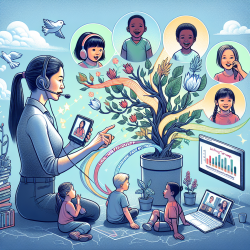Introduction
The COVID-19 pandemic has underscored the importance of ethical considerations in public health responses. As practitioners in the field of special education and online therapy, understanding the ethical frameworks that guide responses to pandemics can enhance our ability to serve our communities effectively. This blog explores insights from the research article "Pandemic Influenza: A Comparative Ethical Approach" by Michael Olusegun Afolabi, focusing on how communitarianism and ethics of care can be applied to improve practice in pandemic scenarios.
Understanding Ethical Frameworks
The research highlights two traditional bioethical lenses: communitarianism and ethics of care. These frameworks offer valuable perspectives for addressing the moral challenges posed by pandemic influenza, emphasizing a shift from individual-oriented to people-oriented approaches.
- Communitarianism: This approach focuses on community and collective well-being. It encourages policies and practices that prioritize the needs of the community over individual interests, fostering a sense of shared responsibility and cooperation.
- Ethics of Care: This framework emphasizes the importance of care and relational ethics. It advocates for a compassionate response that considers the interconnectedness of individuals and the impact of decisions on relationships and communities.
Implementing Ethical Approaches in Practice
For practitioners in special education and online therapy, integrating these ethical frameworks can lead to more effective and compassionate responses during pandemics. Here are some practical steps:
- Community Engagement: Foster strong connections with families, schools, and community organizations to create a network of support. This aligns with the communitarian approach, emphasizing collective action and shared responsibility.
- Empathetic Communication: Utilize the ethics of care by ensuring that communication with students, parents, and colleagues is empathetic and supportive. Acknowledge the challenges they face and offer reassurance and guidance.
- Resource Allocation: Advocate for equitable distribution of resources, such as access to online therapy tools and support services, ensuring that all students have the opportunity to succeed.
- Professional Development: Encourage continuous learning and adaptation by attending webinars, conferences, and workshops focused on ethical practices in pandemic scenarios.
Encouraging Further Research
While this blog provides an overview of ethical approaches to pandemic influenza, further research is essential for practitioners to deepen their understanding and refine their skills. Engaging with scholarly articles, attending relevant conferences, and participating in discussions with peers can enhance one's ability to navigate the complexities of pandemic responses.
To read the original research paper, please follow this link: Pandemic Influenza: A Comparative Ethical Approach.










